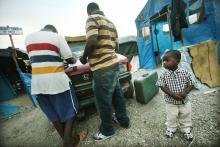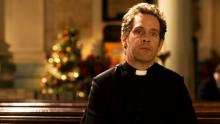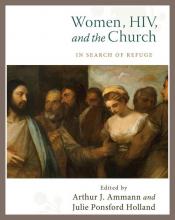Culture

For many centuries Christmas Day worshippers have been hearing these words as their New Testament reading: “For the grace of God has appeared, bringing salvation to all” (Titus 2:11). Grace, everyone used to know, is foundational to the Christian Gospel.
But this Christmas I’m noticing the surprising version of grace in Les Miserables, already seen by 60 million people as a musical and now as a film. Victor Hugo’s novel may be seen as a story of grace transforming in the life of the common man Jean Valjean and grace rejected in the life of the rigid functionary Javert.
As the story begins, Jean Valjean is being released from 19 winters of imprisonment for having stolen some bread to save his sister’s son from starving. But in the eyes of Javert, Valjean will always be a thief, which is his nature, because he has not learned the meaning of the law. Crushed under this ideological overlay, Valjean sees himself as a slave of the law — in a way remarkably similar to that of St. Paul, who makes grace and law antithetical. The chorus confirms it: “Look down, you will always be a slave.”
In his first job after prison, Valjean is deliberately underpaid. When he objects, the boss says: “Why should you get the same as honest men like me?” (Jesus once told a parable about laborers in a vineyard to open people’s eyes to grace.) Valjean concludes that society has closed every door to him. When he is refused lodging, the innkeeper says: “We’re law-abiding people here. Thanks be to God.” The conservative identification with the law is commonly made in alliance with God, while Victor Hugo seems to understand that the Christian vision identifies grace, not law, with God.

In The Last Shot, Frey has written a compassionate book. It is truly a compass that guides us into the sneakers and the hearts of children growing up in the housing projects of Coney Island, New York — inner-city kids defying the law of nature by growing in a tough place like flowers growing through concrete.
It is truly passionate about basketball and life, basketball as it is loved by children, coaches, and communities ... life as it is felt through the hearts of people who know human beings are human beings and not commodities.

Few narratives in the Hebrew Bible are more foreign to us than this week’s lection. We do not give away our children. In a society determined by socio-economic forces utterly beyond the control of individual citizens (e.g., globalization), we do our best to prepare ourselves for the inevitability of change. But what happens when we lose our footing?
Contemporary life changes too fast for habits and routines to have any chance to settle into a pattern. Western individuals must navigate their way through the fears and anxieties that are endemic to such an existence. Such is the pace of change, that effective life-strategies today may be obsolete tomorrow. We will do everything in our power to hold back the floods that threaten to wash away that which we hold dear — especially our children.
What was it like for parents in the Bible? Hannah, Samuel’s mother, was beset by another set of insecurities than those faced by contemporary Westerners. In the socio-economic situation of twelfth-century B.C.E., an Israelite woman’s worth was held in direct proportion to her fertility. Hannah was barren and thus her spirit was troubled to the point that she refused to eat, weeping instead on account of her “great anxiety and vexation” (1 Sam. 1:16 NRSV). In desperation, she made a vow before the LORD of hosts that if God would grant her a son, she would dedicate him to the LORD. The LORD heard Hannah’s prayer and blessed her with Samuel, whom she turned over to Eli the priest, according to her promise.

Christmas is less than two weeks away, and even though most of us probably started cranking the Christmas tunes the day after Thanksgiving, here’s a look at some of this year’s best Christmas compilations so you don’t overplay, say, Amy Grant’s classic 1983 Christmas Collection.

This will be a night to remember!
On Monday, I had the opportunity of attending an advance screening of The Hobbit: An Unexpected Journey with a good childhood friend of mine. I sat in my favorite movie-watching seat (a few rows back and dead center), munching on free popcorn and drinks provided by a fellow moviegoer who wanted nothing more than to ensure that his entire row in the theater was happy and well-fed (not too unlike a Hobbit, really).
Just before the lights dimmed, I remember thinking how perfect the whole moment was. However, as exciting and as wonderful as those final moments of anticipation were, I also couldn’t help but wonder if I might be setting my expectations too high for the film that was about to come.
It turns out I needn’t have worried.

This Christmas, for the spirituality-and-pop-culture enthusiasts on your gifting list, consider the following: Be kind and rewind.
Give them the gift that keeps on giving ... long after the series has been cancelled.
Rev. The Vicar of Dibley. Saving Grace. Davey and Goliath. Pushing Daisies. Six Feet Under. The Book of Daniel. Lie to me. Lost. And Northern Exposure.

Among my must reads are the Sunday New York Times Book Review and other book reviews I come across in various media outlets. There are too many books being published that I would love to read, but just don’t have the time. So, I rely on reading book reviews as one way of keeping in touch with what’s being written. Here are my picks from this week’s books.

“Faith is recognizing that if at Christmas Jesus became like us, it was so we might become more like him,” wrote the well-known preacher and activist William Sloan Coffin. He goes on to add, “We know what this means; watching Jesus heal the sick, empower the poor, and scorn the powerful, we see transparently the power of God at work.”*
Christmas really is about seeing the power of God at work, but far too often pastors and churches fail to tell this story. Oh sure, we preach about Mary and Joseph, Jesus being born in a Bethlehem manger, and the Magi following a star to find him and offer gold, frankincense, and myrrh. My fear is that the story has grown familiar and routine. We have forgotten its power and no longer see its challenge.
In Matthew’s Gospel, the Magi seek out Jesus after hearing of his birth. In order to find him they ask King Herod where they can find the new king. This, of course, is news to Herod who is surprised to learn that his title has been claimed by a baby. Herod consults his advisors and then reacts with the expected calmness of a leader anticipating a conflict, which is to say his response is not calm at all.
This story is an announcement that Jesus has arrived to challenge the powerful. The Messiah was not born meek and mild.
Up-and coming-/singer-songwriter Noah Gundersen stopped by the Sojourners office to talk with our Brandon Hook about music, his new album Family, God, and creativity.
The Seattle-based folk artist was recently featured on Spotify’s Emerge app, which pits rising artists against each other based on play frequency, and is currently on a U.S. tour.
Special thanks to Noah for stopping by and being so open with us!

Many boys at my school struggle with reading. Most are more interested in video games and outdoor activities than books. Our school is not an anomaly.
Across the country adults have grappled with the lag in boys’ reading interest and skills. According to the 2010 Kids & Family Reading Report sponsored by Scholastic, fewer than 40 percent of boys said that reading outside the classroom is important.
So when my school’s coordinator asked me to start a lunchtime reading group to get boys interested in reading, I was excited. The first fourth-grade literary lunch would be called BEREAders (Berea Readers).
I am excited about reading.

“I will honor Christmas in my heart, and try to keep it all the year. I will live in the Past, the Present and the Future. The Spirits of all Three shall strive within me.”
– Ebenezer Scrooge from A Christmas Carol.
WILMINGTON, N.C. — ‘Tis the season for “Bah Humbug” and “God bless us every one,” especially as the world caps off a year of celebrations for the 200th anniversary of the birth of novelist Charles Dickens.
Starting this weekend as the Christmas season begins with Advent, cities will transform their streets to Victorian English landscapes with strolling carolers and stage different productions of Dickens' most famous yuletide work, A Christmas Carol.

I DON'T WANT to keep harping about this climate change thing, but someone has to have the singular courage to stand up for the future of our globe. Someone, I mean, besides 98 percent of the world's climate scientists, the governments of every other industrialized nation, and millions of people around the world. Not counting those, I am that man.
Because I have seen the future of a warming planet, and it's not just fraught with melting glaciers and rising oceans. It's also got stink bugs.
Twice a year, Sojourners' editors and its highly esteemed art director drive to a cabin in the mountains of West Virginia to plan future issues. (I will pause briefly for Colorado readers to stop laughing convulsively at the suggestion that hilltops a few hundred feet above sea level can be called "mountains." But if I get carsick on the drive up, I'm calling it a mountain.)
After we arrived this fall—and my stomach finally calmed down—we settled into our usual method of magazine planning: a rapid-fire brainstorming of ideas both provocative and ground-breaking, but not so much that it keeps me awake. Then came the first telltale tapping sounds from the window.
A half-dozen stink bugs had gathered on the inside of the pane, with a dozen more on the outside, all of them repeatedly bumping into the window, unable to decide on one plan of action. But enough about Mitt Romney.

Something called a GiveBox appeared
this fall on Falckensteinstrasse, and my first gift
was a memory: Dorothy Day, decades ago,
gently quoting St. Basil to me: If you have two coats,
you've stolen one from the poor.
Like a walk-in cupboard on the sidewalk, brightly
painted, decked out with flowers, this GiveBox
is for the anonymous exchange of gifts.
IT'S BEEN ALMOST 45 years since nine Catholic peace activists entered a draft board in Catonsville, Md., filled two wastebaskets with military draft files, and burned the papers in a parking lot. What made the headlines especially big was the involvement of two Catholic priests, Daniel and Philip Berrigan.
For many people, me among them, the Catonsville raid was a turning point in our lives. It also triggered passionate debate about the limits of peaceful protest. Could property destruction be called nonviolent?
The prime movers of the Catonsville Nine were Phil Berrigan and George Mische. Mische had worked for U.S.-funded groups fostering labor movements in the Caribbean and Latin America. Phil had fought as an infantryman in World War II, where his courage won him a battlefield commission. Dismayed that the peace movement was having no discernible impact on events in Vietnam, Berrigan became convinced of "the uselessness of legitimate dissent." He opted for firing the cannons of civil disobedience.
Many U.S. troops were draftees; few had a longing to go to war in a country that posed no threat to the U.S. and whose borders most Americans couldn't find on a globe. The key role conscription played in keeping the war going made draft-board files an obvious target. One of the nine, Tom Lewis, called the files "death certificates."

EXCLUDING WOMEN from leadership weakens the commitment and contributions of churches, theological institutions, and the global church in their participation in God's prophetic mission. It translates to women's priorities and specific needs being inadequately articulated and under-resourced.
For instance, matters of sexuality, reproductive health education, and justice are hardly ever discussed in churches or theological institutions, except when governments want to legalize abortion. Similarly, little attention is given to maternal health care despite the high rates of maternal death and infant mortality in Africa. It is not enough for churches to focus on baptizing children, blessing them, and welcoming them into the house of God when they neglect to care for their well-being from the time they are in their mothers' wombs, especially now that so many children are born HIV-infected. Responsible and healthy sexuality, childbearing, and parenting are matters that require full engagement of both women and men, and the churches should be at the forefront of providing much-needed education.
Women have been left to shoulder the burden of the times: preventing HIV transmission, facing HIV-related stigma, handling deaths, and addressing the myriad other adverse impacts that the HIV pandemic has created. Similarly, in the Circle of Concerned African Women Theologians, of which this author is a founding member, women have provided leadership in naming theological, ethical, cultural, and religious beliefs, as well as harmful practices and leadership styles, that fuel gender disparity, social injustices, and the spread of HIV in religious communities and in society at large. The Circle also has endeavored to provide theological and ethical reflections that are empowering and transformative to the behaviors contrary to God's will for how women and men relate to each other in families, religious contexts, and everyday life.
THE RICH AND THE REST OF US is a stirring call to arms on eradicating domestic poverty. Co-authored by Cornel West and Tavis Smiley, the self-described "poverty manifesto" seeks to convince readers that economic mobility is increasingly difficult for three demographics—the long-term poor, the new poor, and the near poor. Who are the poor in America? According to the Supplemental Poverty Measure, 150 million Americans are at or below twice the federal poverty level, which is $22,040 for a family of four.
Smiley and West invoke Dr. Martin Luther King Jr.'s legacy throughout the book. King's imprimatur legitimizes their attempt to translate the Occupy Wall Street themes of the wealthy 1 percent and the financially fragile 99 percent for a general audience. Interestingly, the book contains a motivational quality reminiscent of self-help books. Each chapter and subsection opens with an inspirational quote or pithy observation. The authors employ statistics, personal anecdotes, poems, and trend analysis to demonstrate the magnitude of poverty in America.
Making poverty history, to use a popular phrase, is an important ideal. To achieve it, we must ask: Who is responsible for eradicating poverty? The co-authors argue that engaged citizens, an active civil society, and a proactive government are the principal agents for helping impoverished families. In several instances, President Lyndon Johnson's War on Poverty represents the promise of the aforementioned three-pronged approach to mitigating the structural causes and personal implications of poverty. From 1964 to 1973, the writers note, the Johnson administration reduced the national poverty rate from 19 percent to 11 percent. Smiley and West successfully contend that government programs play an indispensable role in eradicating poverty.
THREE OF THE best films of the year arrived in early fall and will hopefully still be around to experience by the time you read this. Each deserves to be seen on a big screen—I've long believed that the experience of watching films in a cinema compares with home viewing the same way that visiting the pyramids compares with seeing a mummy in a museum. But whether or not you see these in a cinema, please do see them.
Samsara, Looper, and Seven Psychopaths open up worlds of possibility where the varieties of human experience are respected, the myth of the cool assassin is revised, and the morality of violent fiction is stared in the face, interrogated, and not let go without an attempt at a convincing answer.
Samsara, the sequel to 1992's Baraka, travels the world seeking examples of our diversity and unity: dancers and warriors and builders and menders, broken things and healed things, innocent and wounded. It contains some of the most extraordinary imagery you've ever seen, in tune with vast musical cultures, reimagining our view of what we, a little lower than the angels, are and can be, and, when we're not conscious of our power, the damage we can do.
A Vital Word
In I Told My Soul to Sing: Finding God with Emily Dickinson, Kristin LeMay explores in detail 25 poems as "witnesses" to Dickinson's wrestling with God. LeMay elegantly combines accessible literary analysis with her own spiritual memoir of search, doubt, and faith. Paraclete Press
Blessed Assurance
South African native Jonathan Butler has earned praise in the R&B, contemporary jazz, and gospel music fields. His latest album, Grace and Mercy, offers gentle songs that proclaim faith and hope in the midst of troubled times. Rendezvous Music
BORN IN MEXICO, Francisco X. Stork moved to Texas with his parents when he was 9. After college he studied Latin American literature at Harvard. Stork then decided to get a law degree, planning to make a living as a lawyer while writing fiction on the side. Many years later, he published the first of his five novels, The Way of the Jaguar. He continues to balance his vocation as a novelist for young adults with a "day job" as a lawyer for a Massachusetts state agency that helps develop affordable housing. Former Sojourners editorial assistant Betsy Shirley, now a student at Yale Divinity School, interviewed Stork last spring at Calvin College's Festival of Faith and Writing.
Betsy Shirley: On your blog you say that every author has a bone to which they return again and again to gnaw. What do you gnaw on?
Francisco X. Stork: The question that characters in my books keep asking themselves is, "Why am I here?" I keep coming back to trying to find some kind of meaning to life and to suffering that keeps people going. All my books center on young people who are questioning themselves in that vein. My first book had a person on death row, the second had a young man with someone out to kill him, and the third one had a boy, Marcelo, who was questioning how he could possibly live in a world of suffering. Those questions of mortality make you a little bit more aware of the preciousness of life.